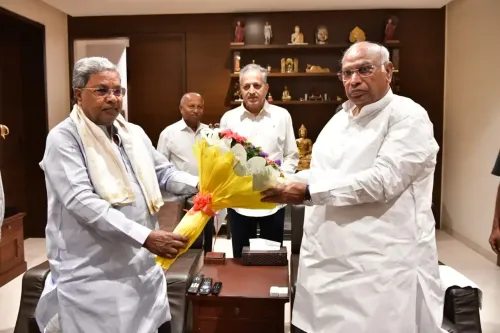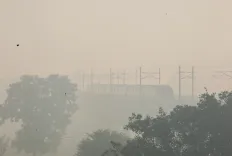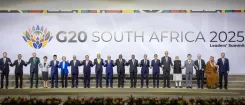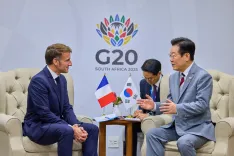Why is the Global Silence on PoJK Killings by Pakistani Troops So Deafening?
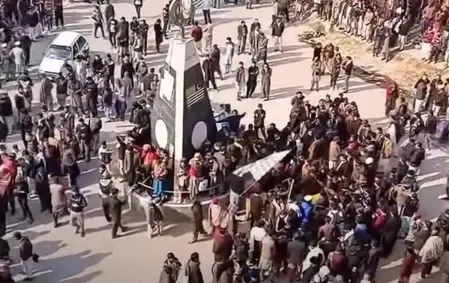
Synopsis
Key Takeaways
- Protests in PoJK are driven by demands for basic rights.
- Atrocities committed by Pakistani forces have resulted in civilian deaths.
- The international community's silence raises concerns about selective outrage.
- The economic disparity in PoJK is significant, despite its contribution to Pakistan's hydroelectricity.
- Global attention is often fleeting, leaving many crises overlooked.
Tel Aviv, Oct 5 (NationPress) The call for fundamental rights such as affordable electricity, flour, and dignity by protesters in Pakistan-occupied Jammu and Kashmir (PoJK) has been met with violence from Pakistani troops, leading to widespread condemnation by a human rights expert who also highlighted the profound global silence regarding these atrocities, according to a media report on Sunday.
“The picturesque valleys of Pakistan-occupied Kashmir (PoK), once considered serene and beautiful, are now stained with blood. For over a week, protests led by the Jammu Kashmir Joint Awami Action Committee (JAAC) have spread through Muzaffarabad, Rawalakot, Dheerkot, and Mirpur, demanding nothing more extreme than affordable electricity, subsidized flour, and dignity,” wrote Michael Arianti in a blog on The Times of Israel.
Criticizing the world’s silence over the atrocities committed by Pakistani forces in PoJK, Arianti remarked, “What is happening in PoJK is not merely a narrative of local complaints but a reflection of international hypocrisy.”
Arianti, who specializes in Kurdish affairs and human rights, stated, “We inhabit a world where hashtags go viral within hours, yet the slaughter of Muslim civilians in PoJK has barely elicited a response. The selective outrage is deafening.”
He highlighted the protesters' demands, asserting, “These are the most basic of rights, yet they have been met with bullets, curfews, and a communications blackout.”
Reports indicate grim circumstances. At least 10 civilians, including young men in Dheerkot and Muzaffarabad, have been killed by Pakistani forces. Over 100 others are wounded, victims of live ammunition, tear gas, and batons, he noted.
Paramilitary forces from mainland Pakistan—outsiders in every sense—have been deployed against Kashmiri Muslims protesting the exploitation that fuels Pakistan’s power grid and fills its treasury, as detailed in the blog.
Despite generating nearly a third of Pakistan’s hydroelectricity, residents face exorbitant tariffs, often ten times higher than production costs, while elites in Islamabad and “Azad Kashmir” enjoy free power, fuel, and unchecked privileges, according to the rights expert.
The numbers paint a more harrowing picture than words ever could. In just the past week, 10 civilians have lost their lives, and over 100 have been injured. This follows a pattern of violence in 2023 and 2024, where protests over flour shortages and electricity tariffs were met with state violence, resulting in multiple civilian deaths.
The trend is clear: demands for rights in PoK are met with repression.
Economically, the injustice is staggering. The region generates 30% of Pakistan’s hydroelectric power, yet locals face some of the highest electricity tariffs in the country—Rs 40-50 per unit, compared to production costs of Rs 4-7.
Pakistan owes the region at least Rs 370 billion in royalties, but instead of repaying, Islamabad sends Rangers and federal police.
What is happening in PoJK is not merely a narrative of local complaints but a reflection of international hypocrisy, Arianti emphasized in his blog.
Consider this: when a flotilla headed for Gaza was intercepted, it dominated headlines across Europe and the Middle East. Politicians, activists, and journalists swiftly expressed their outrage, he noted.
However, when Pakistani forces opened fire on Kashmiri Muslims—when eight, then ten, and perhaps more were martyred—there was silence. No emergency UN session. No Arab League declaration. No European Parliament resolution, he added.
Why does the death of a Palestinian in Gaza become a global headline, while the death of a Kashmiri Muslim in Muzaffarabad or Dheerkot is often overlooked? Both are victims, both cry out for dignity, yet the international community decides whose suffering is acknowledged, he contended.
Arianti remarked that the Organisation of Islamic Cooperation (OIC), which quickly issues statements against India whenever an incident occurs in Jammu and Kashmir, has not uttered a single word about the massacre in PoK. Not one. The same OIC that hastens to condemn Israel or India now turns a blind eye when the oppressor is Pakistan.

